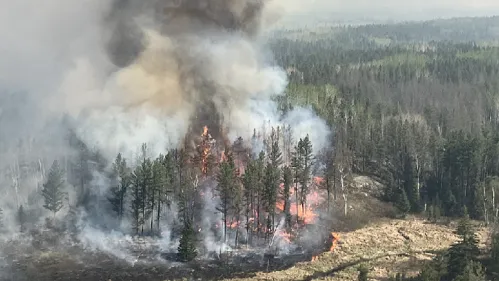Wildfires Limit Global Forest Recovery Capabilities Study Warns

A recent study highlights a troubling decline in the global capacity for forests to recover following large-scale wildfires, emphasizing a pressing need for international collaboration to enhance resilience in these ecosystems.
Conducted by a collaborative team of Chinese and international researchers, the study reveals that less than one-third of the forests impacted by wildfires can regenerate within seven years post-fire, underscoring a significant environmental challenge.
Published in the esteemed journal Nature Ecology & Evolution, the research identifies critical factors influencing forest recovery across diverse climatic zones and periods, uncovering an alarming trend of increasing sensitivity of forest resilience to the severity of wildfires.
Led by Chen Ziyue of Beijing Normal University, along with Wu Zhaoyang from the Chinese Academy of Sciences and Josep Penuelas from Spain's Autonomous University of Barcelona, the study utilized an innovative hybrid methodology to analyze 3,281 significant wildfire events worldwide.
Findings from the research indicate that the median severity of major wildfires escalated by 42.9 percent in arid regions and 54.3 percent in boreal zones after 2010. Areas particularly affected include western North America, northern-central Siberia, and southeastern Australia.
Moreover, the study reveals that post-fire recovery rates have notably declined since 2010, with the percentage of regions experiencing stagnated recovery rising from 22.6 percent to 25.6 percent. This deterioration in recovery is especially evident in the restoration of forest canopy and productivity.
The research warns that diminished resilience post-fire could lead to drastic losses in biodiversity and biological resources, as well as in the forests' capacity to act as carbon sinks, which could overwhelm the direct emissions caused by fires and severely disrupt global carbon cycling.
This worrying situation is compounded by the growing occurrence of extreme climate events, such as heatwaves and droughts, which leave affected forest ecosystems grappling with unprecedented challenges in their natural recovery efforts.
Chen has suggested that traditional natural recovery processes are increasingly unable to withstand mounting climate pressures, advocating for systematic international interventions during crucial recovery phases, including well-planned reforestation and ecological restoration initiatives.
Notably, Australian expert David Bowman from the University of Tasmania referred to the study as 'an influential paper about a deeply serious topic,' reinforcing the urgent call for action in response to this alarming trend.
Read These Next

China's First Domestically Made Large Cruise Ship Sets Sail
China's first large cruise ship, Adora Magic City, set sail from Shanghai on Monday, marking a milestone for local shipbuilding.

China Holds See-Off Ceremony for Shenzhou-20 Astronauts
China held a ceremony for the Shenzhou-20 astronauts at Jiuquan, boosting its human spaceflight and exploration efforts.

The AWS Outage: Rethinking Big Tech Reliance
An analysis of the recent AWS outage, its implications on global reliance on major tech firms, and the need for greater diversification and resilience in cloud computing.
